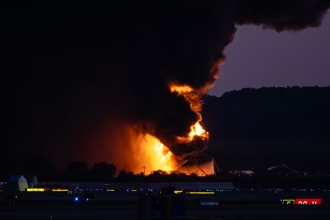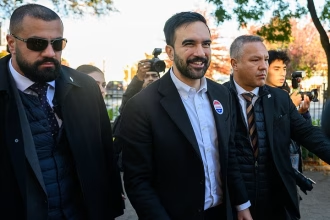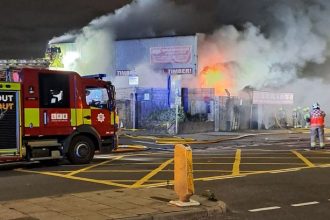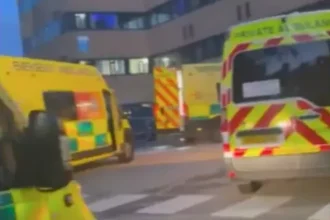- Morning opening: The marking process
- Can Spanish PM survive corruption cases against family and allies?
- Outrage in Paris as Shein prepares to open its first permanent store
- Dutch coalition forming process to get under way today
- Worker dies after being rescued from partially collapsed medieval tower in Rome
- Czechs mourn death of Catholic leader Duka
- EU’s rule of law reports ‘even less comprehensive’ this year, risks ‘backsliding’, campaigners warn
- Morning opening: The marking process
Morning opening: The marking process
Jakub Krupa
The European Union is set to reveal its ratings for candidate countries later today, assessing the progress they are making on the path to become the union’s members in the future.
We will hear from the EU’s foreign policy chief, Kaja Kallas, and the enlargement commissioner, Marta Kos, early afternoon.
Lots of potential lines to look out for there, as we will get the commission’s assessment of the worsening situation in Georgia, the attempts to reform Ukraine despite the on-going Russian aggression, and their look at the western Balkan countries, including Serbia, which sees continued protests against Aleksandar Vučić’s rule.
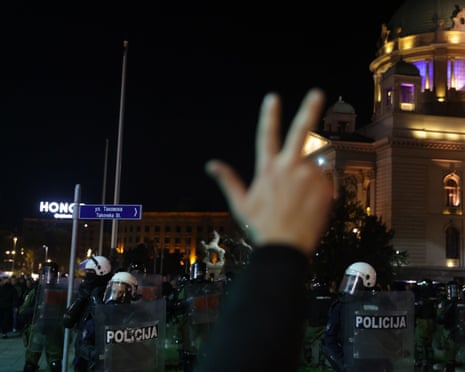 A man shouts slogans at pro-government supporters as riot police officers divide pro-government supporters and supporters of Dijana Hrka, mother of Stefan Hrka, one of the victims of the Novi Sad train station accident, as she begins her hunger strike in Belgrade, Serbia. Photograph: Andrej Čukić/EPA
A man shouts slogans at pro-government supporters as riot police officers divide pro-government supporters and supporters of Dijana Hrka, mother of Stefan Hrka, one of the victims of the Novi Sad train station accident, as she begins her hunger strike in Belgrade, Serbia. Photograph: Andrej Čukić/EPA
Separately, I will keep an eye on the EU defence commissioner Andrius Kubilius’s meeting with Nato’s secretary general Mark Rutte in Brussels on rearming Europe.
There is also more news from the Netherlands, the Czech Republic, Germany, and others.
Lots for us to go through.
It’s Tuesday, 4 November 2025, it’s Jakub Krupa here, and this is Europe Live.
Good morning.
Share
Key events
Show key events only
Please turn on JavaScript to use this feature
Can Spanish PM survive corruption cases against family and allies?
 Sam Jones
Sam Jones
in Madrid
Despite spending the past 18 months variously defending his wife, his brother, his party, his attorney general and his government against a relentless slew of corruption allegations, Spain’s socialist prime minister, Pedro Sánchez, has not entirely lost his sense of humour.
Pedro Sánchez speaks at the plenary session of the Spanish parliament. Photograph: Album/Alamy
Three weeks ago, Alberto Núñez Feijóo, the leader of the opposition conservative People’s party (PP), rattled off the familiar litany of accusations and concluded by suggesting the man sitting opposite him in congress was neither “a decent or worthy prime minister” but rather a seasoned enabler of corruption. After the giddy applause that greeted Feijóo’s speech from the PP benches had died down, Sánchez rose to his feet and uttered two words.
“Ánimo, Alberto,” he said. “Chin up, Alberto.”
The prime minister’s retort would appear to have been carefully chosen to remind Feijóo’s party of its own problems.
Seven years ago, Sánchez became prime minister by using a vote of no confidence to topple the PP government of one of Feijóo’s predecessors, Mariano Rajoy. By then, the conservative party was so mired in scandals that Sánchez accused it of turning Spanish politics into a “corruption thriller”.
In a series of leaked text messages, Rajoy told his close ally, the former PP treasurer Luis Bárcenas, to “be strong” and to keep his chin up as the net closed around him – hence the “Ánimo, Alberto” dig.
In May 2018, Bárcenas was jailed for 33 years for fraud and money laundering, and the PP itself was found to have profited from an illegal kickbacks-for-contracts scheme. A week later, the PP was out of government and Sánchez was Spain’s new prime minister.
Given what happened to Rajoy and his government, some may see Sánchez’s taunt as tempting fate.
But the prime minister has insisted he has worked to tackle corruption and is adamant the cases against his family are politically motivated vendettas waged by his right and far-right opponents and their media supporters.
More controversially, he has also cast doubts on the independence of some members of the Spanish judiciary, claiming in an interview at the beginning of September “there’s no doubt that there are judges doing politics and there are politicians trying to do justice”.
Read more about Sánchez’s problems here:
Share
Outrage in Paris as Shein prepares to open its first permanent store
 Angelique Chrisafis
Angelique Chrisafis
in Paris
The online fast-fashion retailer Shein will open its first permanent bricks-and-mortar store in the world in Paris this week amid political outrage, fury from workers and warnings from city hall that it will damage the French capital’s progressive image.
The BHV facade a few hours before the opening of the controversial brand Shein’s first physical store in the world in Paris, France. Photograph: Poitout Florian/ABACA/Shutterstock
The Singapore-based clothing company, which was founded in China, has built a massive online business despite criticism over its factory working conditions and the environmental impact of low-cost, throwaway fashion.
Shein, which has previously trialled temporary pop-up stores, will on Wednesday open a permanent shop on the sixth floor of Paris’s prestigious BHV department store, a historic building that has stood opposite Paris’s city hall since 1856. There are about 23 million Shein customers in France, one of its biggest European markets.
But with vast banners for Shein draped across the building, the brand’s arrival has sparked outrage over the promotion of fast fashion.
The office of the French minister for small businesses said Shein’s Paris presence sent “a bad signal that should be avoided”. Several leading independent French fashion brands have pulled their products from the BHV store in protest.
“There would be no sense being sold in the same shop as Shein,” Guillaume Alcan, a co-founder of the French ethical footwear brand Odaje, told Le Monde.
The company has also separately pledged to cooperate with French prosecutors who have opened an investigation into the sale of childlike sex dolls on its platform.
Share
Dutch coalition forming process to get under way today
Meanwhile over in the Netherlands, the coalition forming process is about to start this afternoon as leaders of the main parties meet to discuss next steps and appoint a “scout” to see what’s possible.
The meeting is scheduled for 4pm local time today, and will be hosted by the parliament speaker, Martin Bosma.
D66 leader Rob Jetten responds to the results of the House of Representatives elections. Photograph: Hollandse Hoogte/Shutterstock
The final forecast by the Dutch news agency ANP last night suggested that both the centrist D66 party, led by charismatic Rob Jetten, and the far-right VPP party by Geert Wilders will have 26 seats each in the new parliament.
After counting the overseas vote, the centrists appeared to be firmly on course to win the most votes by just under 30,000 votes over Wilders’s party, but they are unlikely to get the additional, 27th seat as hoped.
This complicates the coalition forming process a bit, as a potential alternative coalition scenario with VVD, the Christian Democrats in CDA, and JA21 would no longer have the required majority in the new parliament.
A broader coalition involving the centre-left GL-PvdA party remains the default scenario, but persuading the conservative-liberal VVD party to join a left-wing party in the government is likely to prove to be tricky.
Jetten – widely expected to be the next prime minister, the youngest in the Dutch history and the country’s first out gay to lead the government – hopes to have the new government as soon as possible, but the outgoing caretaker, Dick Schoof, has indicated he still expects to be in place at Christmas.
Share
Worker dies after being rescued from partially collapsed medieval tower in Rome
 Angela Giuffrida
Angela Giuffrida
in Rome
Separately, a Romanian worker who was trapped for hours under rubble in Rome after the partial collapse of a medieval tower has died in hospital, just a short time after he was pulled free by emergency services.
The medieval tower Torre dei Conti near the Roman Forum is engulfed by a cloud of debris from a second collapse after it had partially collapsed during renovation works, in Rome, Italy. Photograph: Domenico Stinellis/AP
“I express deep sorrow and condolences, on behalf of myself and the government, for the tragic loss of Octay Stroici, the worker who was killed in the collapse of the Torre dei Conti in Rome,” Italy’s prime minister Giorgia Meloni said in a statement after midnight. “We are close to his family and colleagues at this time of unspeakable suffering.”
Two section of the 29-metre (95ft) Torre dei Conti, near the Colosseum, crashed to the ground, videos posted on social media showed. The first collapse took place at about 10.30am UK time, the second about 90 minutes later.
Clouds of dust billowed out of the windows, along with the sound of collapsing masonry. The second collapse happened while firefighters worked on the structure with aerial ladders. None of the firefighters were injured.
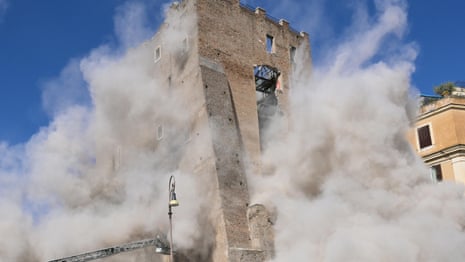 Moment part of medieval tower in Rome collapses – video
Moment part of medieval tower in Rome collapses – video
Authorities said he was conscious during the lengthy rescue operation before he was hospitalised in critical condition. He died shortly after he arrived at the hospital.
Share
Czechs mourn death of Catholic leader Duka
In other news, Czechs are mourning the Catholic archbishop emeritus of Prague, Dominik Duka, who has died overnight at the age of 82.
Cardinal Duka – whose father flew in the British RAF during the second world war – was one of the most influential religious leaders in the Czech Republic, serving as a dissident priest under communism who eventually got imprisoned alongside playwright turned president Václav Havel.
After 1989, he played a pivotal role as the church sought to reinstate itself in the Czech public life, becoming the archbishop of Prague in 2012, and leading the church through a difficult debate about the restitution of property confiscated under communism.
But in recent years he also faced growing criticism over his increasingly outspoken positions on public issues, including Russia, and Muslim immigration, with the Radio Prague’s International service calling him a “a divisive yet defining church leader.”
AFP also noted that Duka repeatedly came under fire during his time as archbishop of Prague from 2010 until 2022, including for allegedly protecting paedophile priests.
Outgoing prime minister, Petr Fiala, said he “respected his courage and activity during the time of totalitarianism,” and “appreciated his important role in the renewal of the church in the democratic society.”
Incoming Czech billionaire turned prime minister, Andrej Babiš, also paid tribute to Duka’s service which “for many years helped shape the spiritual and social life of our country.”
Duka’s funeral is planned for 15 November.
Share
Updated at 12.14 CET
EU’s rule of law reports ‘even less comprehensive’ this year, risks ‘backsliding’, campaigners warn
Speaking of the marking process, the civil rights group Liberties has also just published its assessment of the EU commission’s separate annual rule of law report, which looks at the union’s member states and their work in this area.
In a scathing summary, the assessment found that the EU’s analysis “in key areas was even less comprehensive, with key issues neglected and no consequences for non-compliance with recommendations,” with some parts of the report literally “repeated verbatim, regardless of the level of progress, the seriousness of the violation, or the implications of continued inaction” from previous years.
It said that “Hungary stands out as an outlier, holding the highest number of recommendations with persistent ‘no progress’ status, underscoring deep-rooted governance issues and resistance to EU-level oversight.”
But “other countries showing notable stagnation include Italy, Bulgaria, Ireland, and Germany, each with five or six recommendations that remain unaddressed since 2022.”
In total, “the share of recommendations fully implemented fell from 11% in 2023 to 6% in both 2024 and 2025,” it said.
“This indicates that the Annual Rule of Law Report risks becoming a symbolic monitoring exercise rather than a real tool to protect the rule of law and fundamental rights. The main recommendation to tackle persistent non-compliance is to strengthen enforcement mechanisms, including infringement proceedings and budget conditionality, ensuring that they are applied in a regular and timely manner,” Liberties said.
The group warned that “without rapid action, we fear the backsliding will escalate and changes will become very difficult to reverse.”
The report is here.
Share
Morning opening: The marking process
 Jakub Krupa
Jakub Krupa
The European Union is set to reveal its ratings for candidate countries later today, assessing the progress they are making on the path to become the union’s members in the future.
We will hear from the EU’s foreign policy chief, Kaja Kallas, and the enlargement commissioner, Marta Kos, early afternoon.
Lots of potential lines to look out for there, as we will get the commission’s assessment of the worsening situation in Georgia, the attempts to reform Ukraine despite the on-going Russian aggression, and their look at the western Balkan countries, including Serbia, which sees continued protests against Aleksandar Vučić’s rule.
A man shouts slogans at pro-government supporters as riot police officers divide pro-government supporters and supporters of Dijana Hrka, mother of Stefan Hrka, one of the victims of the Novi Sad train station accident, as she begins her hunger strike in Belgrade, Serbia. Photograph: Andrej Čukić/EPA
Separately, I will keep an eye on the EU defence commissioner Andrius Kubilius’s meeting with Nato’s secretary general Mark Rutte in Brussels on rearming Europe.
There is also more news from the Netherlands, the Czech Republic, Germany, and others.
Lots for us to go through.
It’s Tuesday, 4 November 2025, it’s Jakub Krupa here, and this is Europe Live.
Good morning.
Share
SOURCE PAGE





